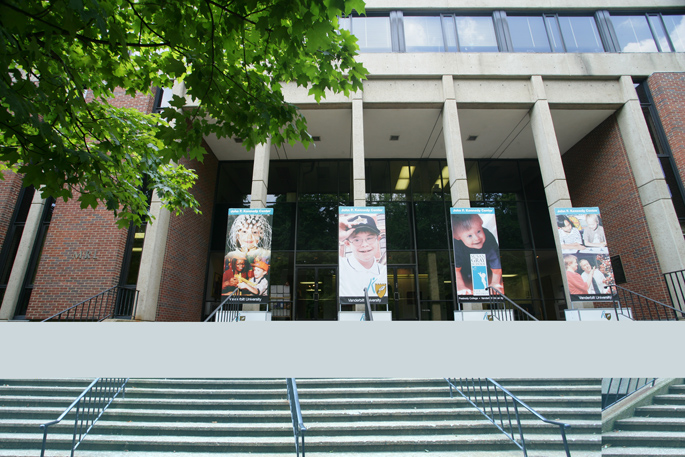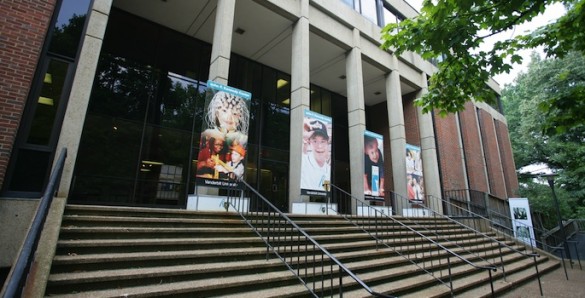The Vanderbilt Kennedy Center (VKC) has been awarded a $6.5 million, five-year grant to continue as a national Eunice Kennedy Shriver Intellectual and Developmental Disabilities Research Center (IDDRC).
In 2015, the center is celebrating its 50th anniversary as one of the nation’s original research centers dedicated to advancing the diagnosis, prevention, treatment and amelioration of intellectual and developmental disabilities.
Funded by the Eunice Kennedy Shriver National Institute of Child Health and Human Development (EKS NICHD), the grant will support four scientific cores to support basic and applied research on intellectual and developmental disabilities (IDD), an administrative core, and a research project. VKC director Elisabeth Dykens, Ph.D., Annette Schaffer Eskind Professor and professor of Psychology, Psychiatry and Pediatrics, is the principal investigator.
“The Vanderbilt Kennedy Center has a distinguished history in research and in the care of children and adults with developmental disabilities,” said Jeff Balser, M.D., Ph.D., vice chancellor for Health Affairs and dean of Vanderbilt University School of Medicine. “This grant comes at a pivotal time as scientists develop new tools to understand brain development over the life span, and to understand the interplay between genetics and environment. These new areas of discovery over time will translate into improvements in the prevention and treatment of developmental disabilities.”
The four IDDRC scientific cores and faculty directors and associate directors, respectively, are Clinical Translational Core, Dykens and Paul Harris, Ph.D.; Translational Neuroimaging Core, Laurie Cutting, Ph.D., and Sasha Key, Ph.D.; Neuroscience Core, Karoly Mirnics, M.D., Ph.D., and Fiona Harrison, Ph.D.; and Biostatistics and Bioinformatics, Frank Harrell, Ph.D., and Julie Lounds Taylor, Ph.D. The grant also supports Administrative Services, led by Dykens, Mirnics, Tim Stafford, M.M.H.C., director of operations, and Jan Rosemergy, Ph.D., deputy director.
“New to the IDDRCs is the requirement that the NICHD grant support a significant research project related to one or more of the five NICHD focus themes identified as IDD research needs,” Dykens said. “With this grant we’ll support an exciting project to investigate sensory and multisensory contributions to autism, which will be led by Dr. Mark Wallace. Translational research is more important than ever in the IDDRC network. Our Medical Center’s innovative translational research and its centers like VICTR allow us collaborations to enhance discovery.”
The IDDRC grant competition is open to all research universities, and EKS NICHD funds only 15 such centers nationally. The Vanderbilt Kennedy Center is among the few centers that also have funding as a University Center for Excellence in Developmental Disabilities and as a site for a Leadership Education in Neurodevelopmental and Related Disabilities training. These three program types, all with different federal funding sources, constitute the tri-part national IDD network.
“Successful renewal is a tribute to the leadership of Elisabeth Dykens, to the outstanding Vanderbilt scientists who lead the Center’s research cores, and to the many biomedical and behavioral researchers who are Center investigators,” Balser said.
The IDDRC cores support 69 research projects led by 46 investigators in the School of Medicine, Peabody College of education and human development, the College of Arts and Science and the School of Engineering.
“The Vanderbilt Kennedy Center is enormously proud to continue as a part of the distinguished network of national Intellectual and Developmental Disabilities Research Centers,” Dykens said. “We’re grateful to the leadership of Vanderbilt University and its Medical Center, because institutional commitment is absolutely critical in obtaining this funding.
“I’m also grateful to the leaders of our scientific cores, each of whom contributed to the conceptualization and justification of research support services. We’re celebrating this wonderful achievement because we understand that this center’s mission is so important to improving the lives of children and adults with developmental disabilities.”
For more information about the Vanderbilt Kennedy Center, visit vkc.mc.vanderbilt.edu.














